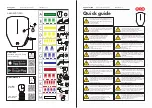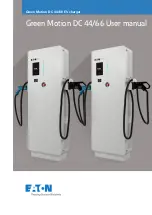
NOTE:
For vehicles equipped with Remote Start, the
climate controls will not function during Remote Start
operation if the blower control is left in the “O” (Off)
position.
2. Recirculation Control
Pressing the Recirculation Control button will temporar-
ily put the system in recirculation mode. This can be used
when outside conditions such as smoke, odors, dust, or
high humidity are present. Activating recirculation will
cause the LED in the control button to illuminate.
NOTE:
•
Continuous use of the Recirculation mode may make
the inside air stuffy and window fogging may occur.
Extended use of this mode is not recommended.
•
The use of the Recirculation mode in cold or damp
weather will cause windows to fog on the inside,
because of moisture buildup inside the vehicle. Select
the outside air position for maximum defogging.
•
The A/C will engage automatically to prevent fogging
when the recirculation button is pressed and the mode
control is set to panel or Bi-Level.
•
Recirculated air is not allowed in Defrost modes. If the
Recirculation button is pressed while in this mode, the
LED indicator will flash several times then go out.
Recirculation will be disabled automatically is this
mode is selected.
•
The A/C can be deselected manually without disturb-
ing the mode control selection.
•
When the ignition switch is turned to the LOCK
position, the recirculation feature will be cancelled.
3. Temperature Control
Rotate this control to regulate the temperature of the air
inside the passenger compartment. Rotating the dial left
4
UNDERSTANDING YOUR INSTRUMENT PANEL
369
Summary of Contents for 2013 Dart
Page 4: ......
Page 7: ...1 INTRODUCTION 5 ...
Page 10: ......
Page 73: ...Not Seated Properly Not Seated Properly 2 THINGS TO KNOW BEFORE STARTING YOUR VEHICLE 71 ...
Page 74: ...Not Seated Properly Not Seated Properly 72 THINGS TO KNOW BEFORE STARTING YOUR VEHICLE ...
Page 100: ......
Page 145: ...3 UNDERSTANDING THE FEATURES OF YOUR VEHICLE 143 ...
Page 146: ...144 UNDERSTANDING THE FEATURES OF YOUR VEHICLE ...
Page 147: ...3 UNDERSTANDING THE FEATURES OF YOUR VEHICLE 145 ...
Page 179: ...Voice Tree 3 UNDERSTANDING THE FEATURES OF YOUR VEHICLE 177 ...
Page 181: ...3 UNDERSTANDING THE FEATURES OF YOUR VEHICLE 179 ...
Page 192: ...Voice Tree 190 UNDERSTANDING THE FEATURES OF YOUR VEHICLE ...
Page 194: ...192 UNDERSTANDING THE FEATURES OF YOUR VEHICLE ...
Page 196: ...194 UNDERSTANDING THE FEATURES OF YOUR VEHICLE ...
Page 198: ...196 UNDERSTANDING THE FEATURES OF YOUR VEHICLE ...
Page 200: ...198 UNDERSTANDING THE FEATURES OF YOUR VEHICLE ...
Page 239: ...One Half Second Tone Slow Tone 3 UNDERSTANDING THE FEATURES OF YOUR VEHICLE 237 ...
Page 240: ...Slow Tone Fast Tone 238 UNDERSTANDING THE FEATURES OF YOUR VEHICLE ...
Page 241: ...Fast Tone Fast Tone 3 UNDERSTANDING THE FEATURES OF YOUR VEHICLE 239 ...
Page 282: ......
Page 287: ...INSTRUMENT CLUSTER BASE 4 UNDERSTANDING YOUR INSTRUMENT PANEL 285 ...
Page 288: ...INSTRUMENT CLUSTER PREMIUM ANALOG 286 UNDERSTANDING YOUR INSTRUMENT PANEL ...
Page 289: ...INSTRUMENT CLUSTER PREMIUM DIGITAL 4 UNDERSTANDING YOUR INSTRUMENT PANEL 287 ...
Page 384: ......
Page 444: ...442 STARTING AND OPERATING ...
Page 490: ......
Page 574: ......
Page 582: ......
Page 593: ...INDEX 10 ...
Page 614: ......
















































